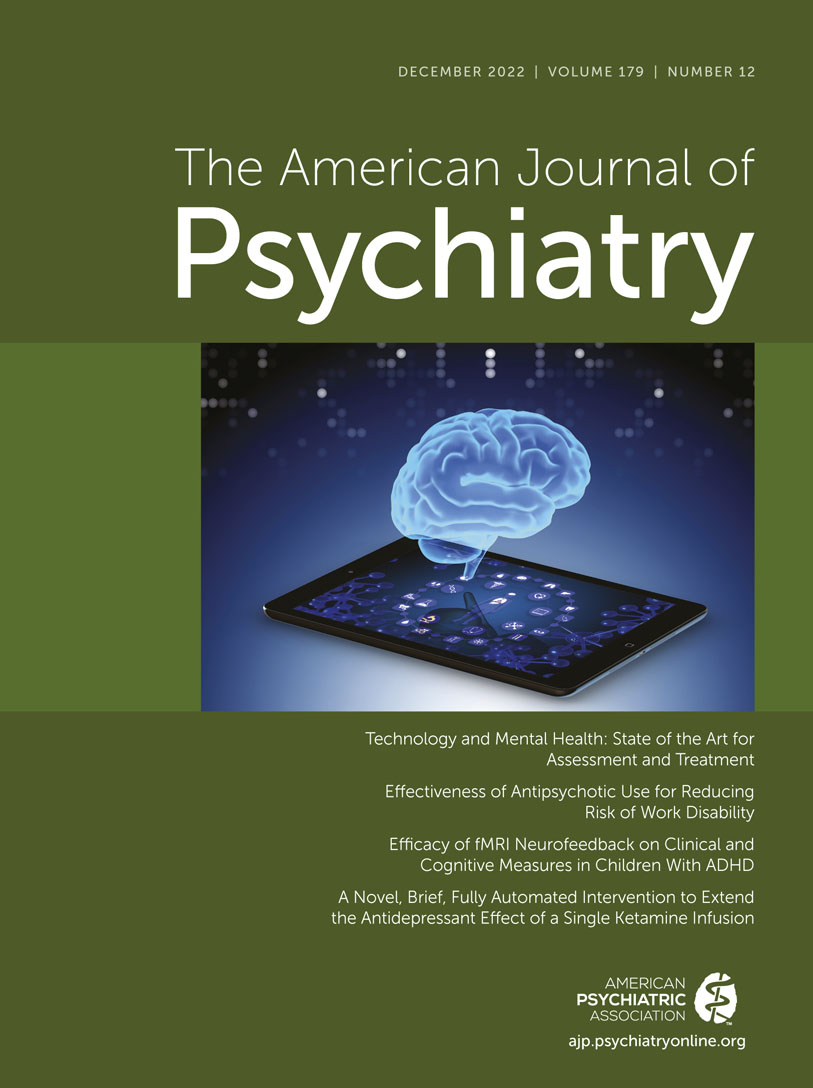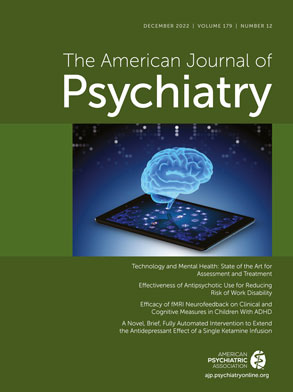Among the eating disorders, binge-eating disorder is thought to be the most common, estimated to have a 3.5% lifetime prevalence in women and a 2.0% lifetime prevalence in men (
5). While it was not considered as a formal diagnosis in DSM-IV, DSM-5 sets forth criteria for binge-eating disorder that include recurrent episodes of binge eating over at least a 3-month period that are associated with rapid food consumption, continuing to eat while feeling full, and eating when not hungry. Additionally, these eating symptoms are accompanied by feelings of embarrassment, disgust, and guilt. Binge-eating disorder frequently co-occurs with obesity but, as Grilo et al. point out, differs behaviorally and likely pathophysiologically from general obesity (
6). Current effective treatments for binge-eating disorder include cognitive behavioral therapy and lisdexamfetamine, which is approved by the FDA for this indication. Additional treatments are needed, and Grilo et al. present efficacy data from a double-blind placebo-controlled randomized clinical trial in patients with binge-eating disorder and comorbid obesity that compares the efficacy of 16 weeks of treatment with four interventions: weekly sessions of behavioral weight loss therapy plus placebo (N=35), bupropion/naltrexone (N=32), bupropion/naltrexone with weekly sessions of behavioral weight loss therapy (N=35), and placebo (N=34). Treatment with bupropion/naltrexone began at low doses and was increased as tolerated to a total dose at 4 weeks of sustained-release naltrexone, 32 mg/day, and sustained-release bupropion, 360 mg/day. These treatments were selected because bupropion/naltrexone is currently FDA approved for weight loss in obese adults, naltrexone is approved for treating opioid and alcohol use disorder, and bupropion is approved for treating depression and smoking cessation. Additionally, earlier studies suggest that behavioral weight loss therapy is effective for reducing binge eating and promoting weight loss. Behavioral weight loss therapy involves focusing on healthy eating behaviors and promoting physical activity along with other behavioral and cognitive techniques. Results from an intention-to-treat analysis demonstrated a significant main effect of behavioral weight loss therapy and a significant effect of medication but not a significant interaction. Specifically, the binge eating remission rates were 17.7% for placebo, 31.3% for naltrexone/bupropion, 37.1% for behavioral weight loss plus placebo, and 57.1% for naltrexone/bupropion plus weight loss therapy. When assessing the frequency of binge eating during the previous month, behavioral weight loss therapy resulted in significantly less binging at all time points when compared with placebo, whereas the naltrexone/bupropion treatment significantly decreased binging only at the 1- and 2-month assessment periods. The behavioral weight loss intervention also resulted in significant weight reductions beginning at 2 months of treatment. In contrast, naltrexone/bupropion treatment did not result in significant weight loss. Again, for weight loss, no significant interactions between naltrexone/bupropion and weight loss therapy were detected. Also, weight loss therapy was generally associated with significant reductions in eating disorder-related psychopathology including depression scores and metabolic parameters such as cholesterol and Hb1Ac; this was not the case for medication therapy. Overall, the results from this study point to both naltrexone/bupropion and behavioral weight loss therapy as being effective for decreasing symptoms associated with binge-eating disorder and suggest that behavioral weight loss therapy is further effective for weight reduction in individuals with binge-eating disorder and obesity.

